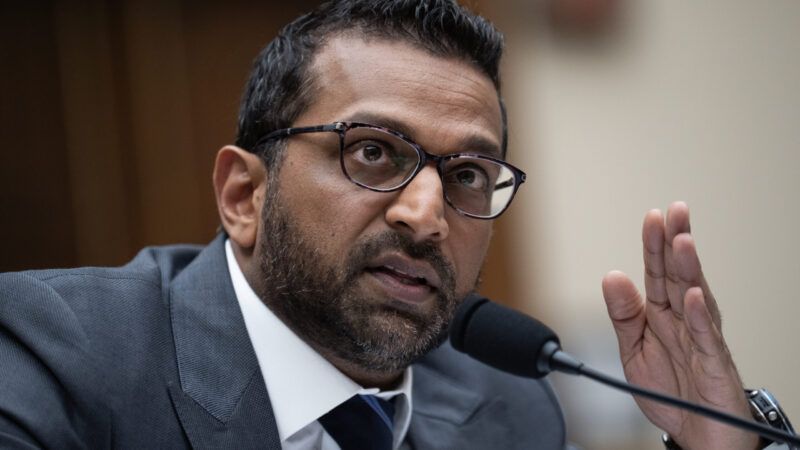Kash Patel Tellingly Ties James Comey's Indictment to the Legally Unrelated 'Russiagate Hoax'
The FBI director's portrayal of the case exemplifies the emptiness of his promise that there would be "no retributive actions" against the president's enemies.

In his 2023 book Government Gangsters, Kash Patel, now the director of the FBI, described a "deep state" conspiracy against Donald Trump that he equated with a conspiracy to subvert democracy and the Constitution. An appendix to the book listed 60 "Members of the Executive Branch Deep State," whom Patel described as "corrupt actors of the first order." The list included former FBI Director James Comey, whom Trump fired in 2017 out of anger over the FBI's investigation of alleged ties between his presidential campaign and the Russian government.
After Trump picked Patel to run the FBI, the nominee assured the Senate Judiciary Committee that, despite his vow to "come after" the "conspirators," there would be "no politicization at the FBI" and "no retributive actions" against the president's enemies. Thursday's indictment of Comey, which charges him with two felonies based on allegedly false congressional testimony in September 2020, epitomizes the emptiness of that promise.
As Patel tells it, the indictment, which was filed just a few days before the charges would have been barred by the five-year statute of limitations, is not a "retributive action." Rather, it is "another step" in keeping the FBI's "promise of full accountability." It just so happens that accountability in this case coincides with pursuing one of the president's many personal vendettas.
"For far too long, previous corrupt leadership and their enablers weaponized federal law enforcement, damaging once proud institutions and severely eroding public trust," Patel said in a press release. "Every day, we continue the fight to earn that trust back, and under my leadership, this FBI will confront the problem head-on. Nowhere was this politicization of law enforcement more blatant than during the Russiagate hoax, a disgraceful chapter in history we continue to investigate and expose. Everyone, especially those in positions of power, will be held to account—no matter their perch. No one is above the law."
Despite that framing, the Comey indictment, on its face, has nothing to do with "the Russiagate hoax." It alleges that Comey lied during a Senate Judiciary Committee hearing on September 30, 2020, when he reaffirmed his earlier testimony that he had not authorized anyone at the FBI to "be an anonymous source in news stories about matters relating to the Trump investigation or the Clinton investigation"—i.e., the FBI probe that examined Hillary Clinton's handling of classified material as secretary of state, including her use of a private email server.
As Sen. Ted Cruz (R–Texas) noted at the 2020 hearing, Comey's testimony contradicted what Andrew McCabe, Comey's former deputy, had told the Justice Department's Office of the Inspector General (OIG). McCabe claimed Comey had approved the disclosure of information about an FBI probe of the Clinton Foundation to The Wall Street Journal, which mentioned that new wrinkle in a story about the email investigation published on October 30, 2016. But the OIG report on the leak credited Comey's version of events and portrayed McCabe as persistently dishonest.
"McCabe lacked candor when he told Comey, or made statements that led Comey to believe, that McCabe had not authorized the disclosure and did not know who did," the report said. "McCabe lacked candor when he told [FBI] agents that he had not authorized the disclosure to the WSJ and did not know who did….McCabe lacked candor when he stated that he told Comey on October 31, 2016, that he [McCabe] had authorized the disclosure to the WSJ" and that "Comey agreed it was a 'good' idea."
The OIG report concluded that "McCabe did not tell Comey on or around October 31 (or at any other time) that he (McCabe) had authorized the disclosure of information about the [Clinton Foundation] Investigation to the WSJ." It added that "had McCabe done so, we believe that Comey would have objected to the disclosure."
Based on the contrary assumption that McCabe was telling the truth, the indictment charges Comey with "willfully and knowingly" making "a materially false, fictitious, and fraudulent statement" to the Senate Judiciary Committee. Under 18 USC 1001(a)(2), that's a felony punishable by up to five years in prison. The indictment also alleges a related felony, subject to the same maximum penalty, under 18 USC 1505, which applies to someone who "corruptly" attempts to "influence, obstruct, or impede" a congressional proceeding.
To successfully defend Comey against those charges, National Review's Jim Geraghty notes, his lawyers "will have to convince at least one juror that former FBI Deputy Director Andrew McCabe is a duplicitous SOB who lied when he claimed Comey had given permission to leak the information when Comey did not. That does not exactly sound like Mission: Impossible."
Given the weakness of the case against Comey, it is not surprising that career prosecutors did not think it was worth pursuing. That resistance explains why the indictment is signed only by Lindsey Halligan, a former Trump lawyer with no prosecutorial experience whom the president appointed as interim U.S. attorney for the Eastern District of Virginia this week after her predecessor, Erik Siebert, proved insufficiently receptive to pursuing charges against Comey and New York Attorney General Letitia James, another Trump nemesis. Even Attorney General Pam Bondi, who on Thursday claimed Comey's indictment reflected the Justice Department's "commitment to holding those who abuse positions of power accountable for misleading the American people," reportedly was skeptical of the case in private.
It is telling that Patel explicitly tied Comey's indictment to "the Russiagate hoax" even though the charges are legally unrelated to that investigation. In a December 2023 podcast interview, Patel made it clear that he was determined to punish the "corrupt actors" who had wronged Trump even if it required some legal creativity. "Whether it's criminally or civilly, we'll figure that out," he said. "But yeah, we're putting all of you on notice."


Show Comments (117)